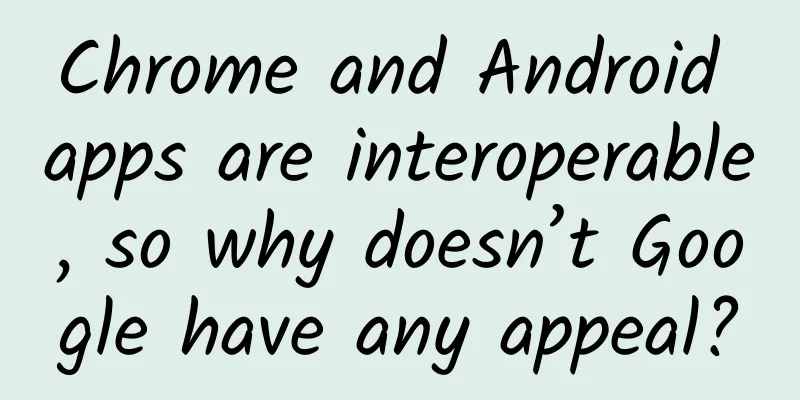Chrome and Android apps are interoperable, so why doesn’t Google have any appeal?

|
In early September, Google brought Android apps to Chrome OS , just as it said at this year's I/O conference. With App Runtime for Chrome, Android apps like Evernote, Duolingo, Sight Words, Vine, and Flipboard can now run on Chrome OS. Some users may be happy to see that Android apps can run on Chrome. However, judging from the data provided by Google, developers don't seem to be very excited. From Google I/O to now, there are only 5 apps adapted for Chrome OS, and they all have perfect web versions and are "active responders" to the multi-platform strategy . Even with the drive of Google, developers give such a response speed . On the other hand, in addition to moving Android apps to Chrome, Google is also thinking about moving Chrome Apps to iOS and Android. In September 2013, Google introduced a new type of Apps for the Chrome browser that can work offline and can run independently without the browser. In January of this year, Google released a developer preview of the tool chain to help developers expand Apps to Android and iOS . When these Chrome Apps are packaged as native applications, they can even be submitted to the Google Play Store and Apple Store for distribution. However, more than half a year has passed since January, and the progress of this project is also very slow. I haven't even seen any follow-up news. I wonder if readers of this article can now remember which Chrome App was distributed to iOS or Android platforms in this way? Even the famous Keep on Chrome has not yet appeared on iOS in this way. Therefore, it is not difficult to see that developers' response to this Google project is also quite cold. In short, Google is currently working on two things: bringing Android apps to the Chrome platform and bringing Chrome Apps to iOS and Android. However, the reality is that neither of these two things has much interest from the developer community, except for Google itself. If you think about it, this is actually quite interesting. Why do I say that? Whether you look at the Chrome Web Store or the Google Play Store separately, compared with similar browsers and mobile operating systems, they have received enough support and response from developers, but when Google wants to mix these two things together, everyone suddenly stops paying attention. You know, there are also many users who use both Chrome and Android or iOS. One of the reasons why this happened is that these actions of Google are contrary to the "mobile first" philosophy of developers. Why do I say that? For the most part, if the developer's goal is the mobile platform, then in today's industry environment, he naturally doesn't care so much about whether the application can run on Chrome. Moreover, apart from making a small number of geek users happy, copying products from Android to Chrome faces huge unknowns. After all, we have not yet seen a precedent of a surge in users and a doubling of revenue from this model. As for whether there will be a precedent in the future, it is hard to say now. As for the second part, bringing Chrome App packages to iOS and Android is even more unpopular. You have to know that in a "mobile first" concept, if you don't provide the best quality experience for mobile platforms, you are simply going against the trend. Moreover, there is no shortage of high-quality applications on iOS and Android platforms. If developers provide a second-rate packaged product, it is almost certain that there will be no market. Of course, you may think that Google's system is for products with cross-platform needs, and the target users are people who use both Chrome and Android or iOS. However, even so, there are still many contradictions, and the concept of "mobile first" cannot be avoided. Which products that are truly cross-platform and value users on each end will provide the best quality experience on each platform like Sunrise? You must know that when the application base of Chrome and Android is large enough, it is not competitive to provide second-rate products on either end. Moreover, today's Internet services are increasingly inclined to store accounts and data in the cloud, and the client is just a form to reach users. Developers have no reason to sacrifice user experience just for "cross-platform". Well, although Google can convince developers to develop products for Chrome and Android, it is only Google itself that is attentive to the interoperability of applications. As a user, I think you will not use products packaged in Chrome App on mobile devices. And for those Android applications running on Chrome, how many of them will you really use? |
<<: Spoiler: WeChat version 5.5, which is currently in beta testing, adds micro-video function
>>: Game engine learning notes: introduction, architecture, design and implementation
Recommend
What is quantum secure communication? (Part 2): The game between quantum spear and quantum shield
Produced by: Science Popularization China Author:...
A "golden seed" creates a "bountiful" scene for beer and wheat!
"The yield per mu is 767.5 kg! This is a new...
How much does a character entry on Baidu Encyclopedia cost? How much does Baidu People cost?
Since Baidu Encyclopedia has a relatively high we...
What are the differences between CT, MRI and B-ultrasound? How do they work? Learn more after reading this
Simply put, CT, MRI, and B-ultrasound are all dev...
Lanzhou WeChat temporary flash sale mini program, how to develop a free flash sale mini program?
The editor of Jimifeng Technology recently survey...
Detailed example explanation: 10 screenshot design techniques to quickly increase download conversion rate!
Apple_HD_Wallpapers_www.laba.ws In the "popu...
How to plan a promotional event to increase followers?
For new media operations, event planning ability ...
Tesla CFO is leaving, former CFO Ahuja to take over
Tesla Chief Financial Officer Jason Wheeler is le...
Cross-platform and cross-device applications may become a hot topic
The popularity of mobile smart devices also bring...
Key points of live streaming sales in Juliang Qianchuan
During this period, there has been an endless str...
When people in the Song Dynasty were sailing, they saw "a woman on the sea", and "she" turned out to be...
According to the Records of Strange Things, a man...
Apple's style has changed drastically, and the iOS 19 interface will undergo major changes!
Apple fans have been expecting Apple to thoroughl...
The Shanghai court accepted the appeal of Wang Zhenhua, the defendants Wang Zhenhua and Zhou Yanfen molested children!
The official WeChat account of the Shanghai Secon...
When did the 2022 Changchun epidemic begin? When will it end and return to normal? Attached is the latest news!
Recently, new cases have appeared in Beijing, Cha...
Using coroutines in Android development | Getting started guide
Continuing from the previous article "Using ...


![Xiao Hu's Jianshu practical SEO drainage course, from 0 to 1, from nothing to something, to help you quickly master Jianshu drainage [12 lessons]](/upload/images/67cc3353d34d0.webp)






